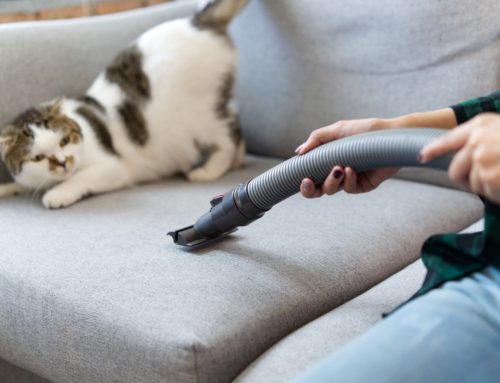Summer is in full swing, and with the temperatures soaring, pet owners have a responsibility to ensure their pets stay cool and comfortable. While keeping your pet cool might seem like common sense, there are some surprising myths that exist about pet heat safety, and our team at Billings Animal Family Hospital is here to reveal some of the most common misconceptions.
MYTH# 1: Rolling the windows down will keep a pet safe in a parked car
According to the American Veterinary Medical Association (AVMA), studies have shown that a parked car with the windows rolled down heats up at almost the same rate as a car with the windows rolled up. AVMA provides more information regarding pets in vehicles with a chart explaining how the interior temperature of a car changes over time. The bottom line is that rolling down windows, parking in the shade, or leaving water inside do not keep pets safe from overheating, and a pet should never be left in a parked car.
MYTH #2: If the temperature isn’t too high, a pet will be fine outside
The outside temperature is not the only indicator pet owners need to assess when considering their pet’s safety during the hot summer months. High humidity levels can be as dangerous as high temperatures. It’s not always overheating that causes problems for pets, it’s also the inability to cool down effectively. Pets pant to evaporate moisture from their airways and rid their bodies of excess heat. On extremely humid days, pets can struggle to cool themselves, and their body temperature can reach dangerous levels. The more humid it is, the lower the heat has to be to negatively affect your pet. By keeping an eye on outside temperature and humidity levels, you can ensure your pet gets their daily exercise while avoiding a heat-related emergency.
- Switch up your walks — Avoid the midday heat when walking your dog, and opt for an early morning or late night stroll instead. When the temperatures and humidity levels are high, keep your walks short, avoid strenuous outdoor aerobic activities, and provide plenty of water for yourself and your pet.
- Test the pavement—Before walking your pet, place your hand on the pavement. If you cannot keep your hand there comfortably for 10 seconds, the pavement is too hot, and your pet should walk on the grass as much as possible to avoid a burn.
MYTH #3: Pets can’t get sunburned
Just like people, pets can suffer sunburn, which can lead to serious problems such as certain types of skin cancer like squamous cell carcinoma, malignant melanomas, and hemangiomas. Any exposed skin is susceptible to sunburn, which also is called solar dermatitis. A pet’s coat covers much of their skin, but certain areas are more prone to sunburn, including:
- Nose
- Tips of the ears
- Muzzle
- Eyelids
- Belly
Hairless breeds are at a much higher risk of sunburn and should be kept out of the sun as much as possible. Sunscreen can protect your pet from sunburn, but only use sunscreen that is made specifically for pets and that does not contain zinc oxide or para-aminobenzoic acid, as these ingredients can be toxic to pets if ingested.
MYTH# 4: Heatstroke only affects people

Heatstroke is a serious condition that affects people and pets. The condition occurs when the body overheats and can lead to organ failure and cardiac arrest if left untreated. Senior pets, overweight pets, and brachycephalic “flat-faced” breeds, such as pugs and bulldogs, have a higher risk of heatstroke and should be closely monitored for signs of overheating. Recognizing the signs and acting quickly can save your pet from long-term complications, or death. Some common signs of heatstroke in pets include:
- Panting
- Vomiting
- Excessive drooling
- Red gums
- Warm and dry skin
- Rapid breathing and increased heart rate
- Lethargy and weakness
- Staring or dull expression
- Seizures
- Collapse
If you notice any of these signs in your pet, call us immediately or go to your nearest veterinary emergency clinic. Do not use ice or extremely cold water to cool your pet, as the sudden change in body temperature can be dangerous.
Summer is a wonderful time to enjoy the outdoors with your pet, and knowing the facts about heat safety will ensure your pet stays safe during your adventures. Summer is also prime time for infectious diseases associated with ticks, fleas, and other parasites, so contact Billings Animal Family Hospital to schedule your pet’s heartworm test and refill their year-round preventives.








Leave A Comment